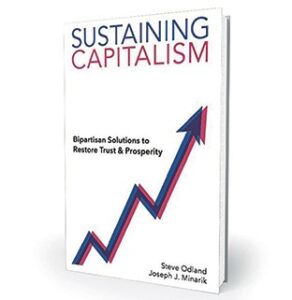Browser History: A Crisis of Trust
Crony capitalism has gotten out of hand. Business leaders are addicted to short-term value. Corporate incumbents use connections to keep disruptors out of their markets—including industry-changing innovations that could boost the economy.
That is, if you believe public opinion.
 But public opinion is exactly what worries Joseph J. Minarik and Steve Odland, co-authors of Sustaining Capitalism: Bipartisan Solutions to Restore Trust & Prosperity. There has been a significant erosion of public trust in corporations and politicians, and it is putting capitalism at risk, they argue. While Mr. Minarik and Mr. Odland focus their assessment on the United States, they argue the same issues can be found across the globe.
But public opinion is exactly what worries Joseph J. Minarik and Steve Odland, co-authors of Sustaining Capitalism: Bipartisan Solutions to Restore Trust & Prosperity. There has been a significant erosion of public trust in corporations and politicians, and it is putting capitalism at risk, they argue. While Mr. Minarik and Mr. Odland focus their assessment on the United States, they argue the same issues can be found across the globe.
The authors call on business leaders to band together to fight short-termism and crony capitalism, and ultimately help to restore public trust in the system. It is a weighty request, but Mr. Minarik says the status quo is likely to only lead down a darker path. He spoke with IQ about why executives must care about fixing capitalism and what they can do to help.
IQ: Can you start by discussing the current threats to capitalism and the necessity of sustaining it?
Joseph Minarik: We perceive the most important problem to be an erosion of trust. There’s a lack of trust between individuals and the nation’s institutions—that includes government and business.
We need to create a new environment in which people have sufficient trust so they are willing to speak to one another and express their opinions to their leaders. They need to have enough confidence in the future so that they are willing to take risks to establish businesses to make investments and help our economy grow.
“Business leaders must step forward, be clear that they understand that our economic system is under stress and that it needs greater support, and make clear that they understand they need to be part of the solution.”
—Joseph J. Minarik
At this point, public attitudes have been sufficiently deteriorated—particularly over the last 10 years, but really over a longer period of time—such that we have great concern about the prospect for the ability of the system to sustain itself. If we allow the capitalist approach to deteriorate and lose out in public trust and in people’s willingness to adhere to it, we would first of all see an erosion of living standards. Then secondly, we could possibly see a revolt against the entire economic system, the consequences of which could be really catastrophic.
We need to keep the American people involved in the workings of the economic system. Share on X To do that, we need to make sure the capitalist system works for them.
IQ: Many of the solutions proposed in Sustaining Capitalism require business leaders to relinquish self-serving pursuits in favor of benefiting society. What will it take for this shift to happen?
JM: We believe business has to take the lead. Business leaders must step forward, be clear that they understand that our economic system is under stress and that it needs greater support, and make clear that they understand they need to be part of the solution.
In particular, they must recognize that there is strength in numbers. They need to step forward together and explain to the population, “Here is what we have to do in order to make our economic system more successful and more sustainable, to make it work for all Americans, and we are prepared to play our part.” We believe that doing this will, at the end of the day, be in the interest of all Americans including those business leaders. Because business cannot be successful if the society on which it is based is not successful as well.
IQ: Can you discuss some of your proposed solutions to corporate short-termism, including how and why CEOs should transition to a multi-stakeholder approach?
JM: There is tremendous pressure for executives to find ways to increase earnings, which very often means the one thing they can do over a very short period of time is cut down on longer-term projects, including investments in physical capital and knowledge capital and so forth.
Those kinds of investments, in physical capital and knowledge capital, always take some time to pay off. So first of all, the corporate manager has to stand up and explain to investors, “This is why I am taking the path that I have chosen. I believe it will be good for our shareholders in the long run and that is why we believe that we, our firm, is a good investment for the future.”
To escape short-termism, businesses will need to adopt a multi-stakeholder approach to value creation. Adopting a long-term perspective leads naturally to a multi-stakeholder approach, since a business cannot prosper over the longer term without taking care of its customers, employees, suppliers and community.
A challenge of the multi-stakeholder approach is that it involves setting priorities and executing tradeoffs. The board and the CEO must find ways to express which stakeholders stand at what place in line of priority, and over what time horizon, while maintaining a cooperative and cohesive relationship among those stakeholders.
IQ: Lately a lot of prominent Silicon Valley executives seem to be a good example of what you encourage in the book, as far as speaking out in the public sphere.
JM: As much as I admire business leaders who are willing to climb out of the foxhole as individuals, I find myself often wishing that before they do so, they reach out to some fellow business leaders and urge them to step out together. Some very prominent business leaders might figure, “I am big enough to stand on my own. I don’t want to water down my own principles. I don’t want to compromise.”
I think business leaders, even those who are in very powerful positions, need to understand that they are just one member of the business community. If everybody in the business community has their own plan, that’s too many. We need one plan.
They need to recognize that the ultimate solution to the problem is going to be one they share with many, many other people—possibly with people who don’t share every detail of their vision. So executives need to be prepared to work with other people and find common ground.



